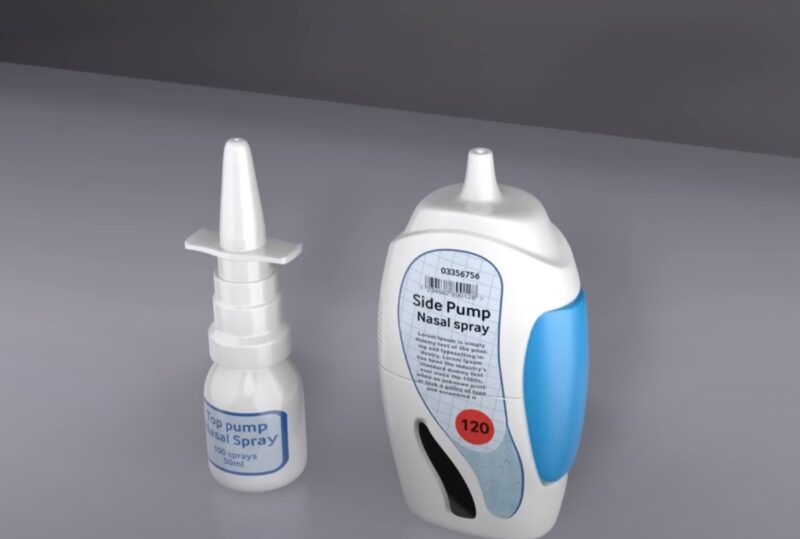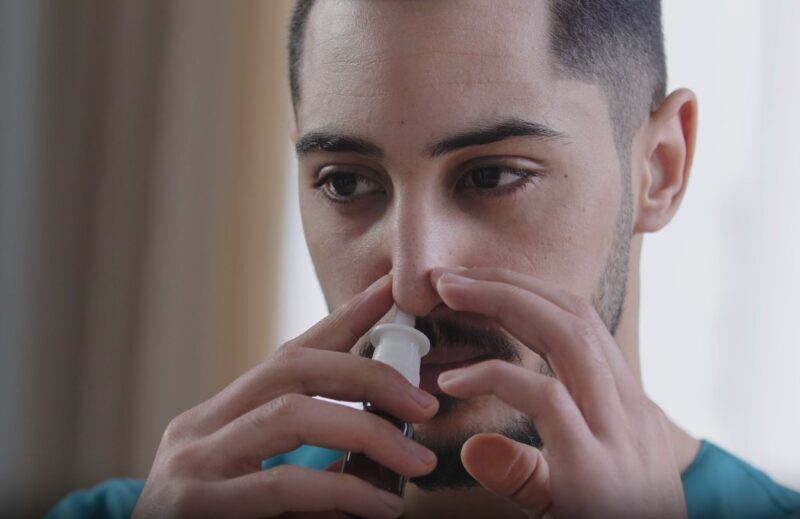When sinus infections strike, the discomfort and pressure can make you desperate for relief. Among the array of options, nasal sprays often emerge as a promising solution. But is this approach right for everyone?
This article will guide you through understanding these infections and the role nasal sprays play in treatment, ensuring you make informed health decisions.
Key Takeaways
What is a Sinus Infection?

A sinus infection, or sinusitis, occurs when your nasal cavities become swollen, inflamed, and infected. This condition can result from viruses, bacteria, or even fungi, leading to symptoms like nasal congestion, pressure around the eyes and forehead, a runny nose, and fever.
The pain and discomfort may vary, often worsening when bending over or during sudden temperature changes. Sinus infections can significantly affect the quality of life, making it difficult to breathe, sleep, and function normally. Early treatment is key to preventing complications and chronic conditions.
| Type of Sinusitis | Duration | Common Triggers | Treatment Notes |
|---|---|---|---|
| Acute Sinusitis | Up to 4 weeks | Cold or allergies | Resolves with proper care and treatment |
| Subacute Sinusitis | 4 to 12 weeks | Unresolved acute sinusitis | Requires further intervention |
| Chronic Sinusitis | More than 12 weeks | Ongoing inflammation | May need comprehensive treatment, including surgery |
| Recurrent Sinusitis | Several times a year | Allergies, structural problems, immune weaknesses | Indicates an underlying issue, needs targeted treatment |
Nasal Sprays: Types and Uses

- Saline: Saline nasal sprays moisturize the nasal passages and help clear congestion. They mimic the body’s natural mucus, facilitating the removal of irritants and pathogens. Safe for people of all ages, these sprays can also aid in the recovery process post-sinus surgery by keeping the nasal lining moist.
- Steroid: Steroid nasal sprays reduce inflammation and are often used for chronic or severe sinus infections. They work by suppressing the immune response that causes inflammation. However, their effectiveness might increase when combined with other treatments, such as antibiotics or saline irrigation, for a multi-faceted approach to sinusitis care.
- Decongestant Nasal Sprays: Decongestant sprays quickly relieve nasal congestion but should not be used for more than three consecutive days to avoid rebound congestion. They work by narrowing the blood vessels in the nose, which reduces swelling and congestion. However, their overuse can lead to dependency and worsen congestion, known as rhinitis medicamentosa.
- Antihistamine: These are used if allergies are contributing to sinus infection symptoms. They work by blocking the action of histamine, a substance in the body that causes allergic symptoms. These sprays can be particularly beneficial during allergy seasons or in environments where allergens are difficult to avoid.
Pros and Cons of Using These Sprays
Pros
| Pros | Description |
|---|---|
| Immediate Relief | Provides quick relief from congestion, reduces facial pain, and eases headaches in sinus infections. |
| Ease of Use | Simple and portable for on-the-go relief, making it convenient for managing symptoms throughout the day. |
| Variety | Different types of nasal sprays target specific symptoms, allowing a tailored approach to symptom management. |
Cons
| Cons | Description |
|---|---|
| Rebound Congestion | Overuse of certain nasal sprays can lead to worsened symptoms, requiring more frequent use. |
| Potential Side Effects | Steroid sprays may cause nosebleeds, sore throat (with long-term use), and nasal irritation. |
| Not a Cure | Nasal sprays treat symptoms, but they don’t cure the underlying infection. |
When to Use Them?

It’s essential to choose the right type of nasal spray based on your symptoms and the duration of your sinus infection. Consultation with a healthcare provider is crucial to ensure appropriate treatment, especially for chronic or recurrent sinusitis.
Understanding the cause of your sinus infection can also guide the choice of nasal spray, ensuring that the treatment addresses the underlying issue effectively.
Alternatives
- Steam Inhalation: Helps to relieve sinus pressure and congestion by opening the nasal passages and thinning out mucus, which allows for easier breathing and can facilitate sinus drainage.
- Neti Pot: Uses saline solution to flush out nasal passages, effectively removing allergens and irritants that contribute to sinus infections, providing a natural and gentle way to maintain nasal hygiene.
- Oral Medications: Decongestants and antihistamines can also help manage symptoms by reducing nasal congestion and addressing allergic reactions that may be at the root of sinus infections.
- Antibiotics: Required if the sinus infection is bacterial, targeting the cause of the infection directly and helping to prevent further complications that could arise from untreated bacterial sinusitis.
FAQs
Can children use nasal sprays for sinus infections?
Yes, children can use certain types such as saline nasal sprays, which are safe and effective for people of all ages. However, it’s important to consult a pediatrician before using steroid, decongestant, or antihistamine nasal sprays in children to ensure safety and appropriateness for their age and health condition.
How quickly do nasal sprays work to relieve sinus infection symptoms?
The onset of action varies depending on the type of nasal spray. Decongestant nasal sprays can work within minutes to relieve nasal congestion, while steroid nasal sprays may take several days of consistent use to start reducing inflammation and symptoms.
Are nasal sprays addictive?
Decongestant nasal sprays can lead to a condition known as rebound congestion if used for more than three consecutive days, which may make it feel like you need to use the spray more frequently.
This is not a true addiction but can result in a cycle of dependency on the spray for relief. Saline sprays and steroid nasal sprays do not cause this issue.
Can I use nasal sprays if I’m pregnant or breastfeeding?
Saline nasal sprays are generally considered safe during pregnancy and breastfeeding. However, for steroid, decongestant, or antihistamine nasal sprays, it’s crucial to consult with a healthcare provider to evaluate the risks and benefits, as some ingredients may not be recommended.
Can using a nasal spray worsen my sinus infection?
Improper use, especially decongestants, can lead to rebound congestion, worsening your symptoms. Additionally, not addressing the underlying cause of the sinus infection and only treating symptoms can lead to prolonged illness or complications.
It’s important to follow usage instructions and consult with a healthcare provider for a comprehensive treatment plan.
How often should I use a nasal spray for a sinus infection?
The frequency of use depends on the type of nasal spray and the severity of your symptoms. Saline nasal sprays can be used several times a day as needed, while steroid nasal sprays often require once or twice daily use according to the prescription.
Decongestant nasal sprays should not be used for more than three days to avoid rebound congestion. Always follow the product instructions or a healthcare provider’s guidance for the best results.
Summary
Nasal sprays can offer significant relief from the symptoms of sinus infections, but their use should be judicious and tailored to your specific condition. Always consult with a healthcare professional to ensure the treatment aligns with your health needs.
